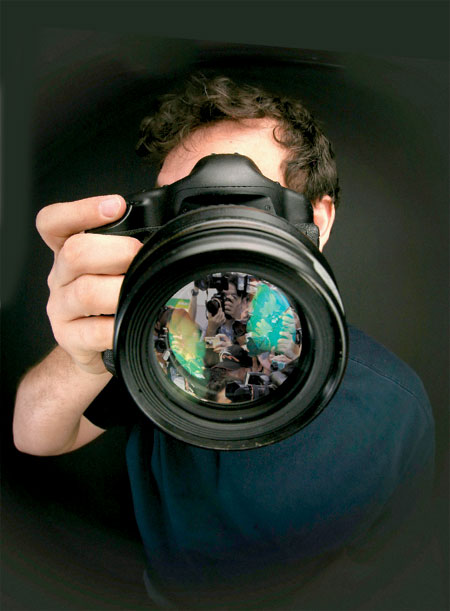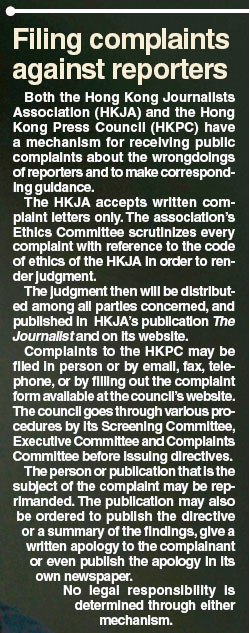The paparazzi: We have them too
Updated: 2011-07-21 07:46
By Kane Wu(HK Edition)
|
|||||||


Hong Kong's paparazzi are considered no less adept at digging up dirt than their tabloid counterparts in the UK. And here sometimes even ordinary people are hurt by reporters in pursuit of the sensational headline. Kane Wu reports.
The global paparazzi scene was thrown into an uproar earlier this month, when the UK's most widely read scandal sheet, the News of the World, was brought down, with the paper's senior staff engaged caught up in a scandal of their own making.
Staff members at the paper hacked into the telephones of thousands of people, including murder victims. In one case, the rogue journalists may have destroyed information vital to police investigating the disappearance and murder of a schoolgirl.
The News of the World, whose parent company, News Corporation, run by media tycoon Rupert Murdoch, did not invent lurid reporting, but surely his US-based organization has helped to spread sensational reporting around the world.
Paparazzi in Hong Kong are considered no less adept at digging out the news than their British counterparts - except here they are called "puppy teams". In the beginning, they stalked, they peeped and pursued, all in the hope of catching racy photos and scandalous tales to set ablaze the covers of entertainment magazines that sell out on newsstands the day they go on sale.
More recently, paparazzi, photo journalists, who specialize in candid photos of celebrities, politicians and other people of prominence have begun intruding into the lives of ordinary people, says Grace Leung, media commentator and columnist who now teaches at the School of Journalism and Communication at the Chinese University of Hong Kong.
Leung, who also serves as head of the Ethics Committee of the Hong Kong Journalists Association (HKJA), cites an incident in which six people died in a traffic accident at Lok Ma Chau in 2009. A newspaper reporter approached the family of one of the men killed. Without giving them the tragic news of the death of their father, the reporter interviewed the victim's two sons, who were home alone at the time. In the following day's edition, the newspaper that employed the reporter carried front page photos of the two smiling sons, along with the account of the tragedy.
"People phoned the HKJA, complaining that the reporter had compounded the injury to the victim's family," Leung says. "The Hong Kong media deviate far from its traditional role of watchdog on the government, upholding social justice. The public trust in the media has been severely sabotaged."
"Hong Kong paparazzi are getting more active and provocative these days," says Leung. Having studied the Hong Kong media scene for more than a decade, Leung knows every trick the paparazzi use.
"They follow celebrities and push them into the corner, waiting to capture the moment the celebrity shows any unfriendly behavior," Leung says.
One member of the paparazzi, we'll call him Billy, remembers a time when he was outside a bar in Lan Kwai Fong, waiting to snap a photo of an actress. Some of his fellow photographers grew impatient. They walked in to the restaurant and started taking pictures. The woman was incensed. "She felt it was a great disrespect, so she rushed out and destroyed our films and deleted the pictures," Billy said. "It happens all the time."
Billy works outside the office every day. He strolls around in posh areas of Central and Causeway Bay during the day and takes in the clamorous nightlife zone of Lan Kwai Fong at night. His days are spent scanning the unending blur of the crowded streets in search of a familiar face.
Billy is a photographer for an entertainment magazine, waiting for the moment when he can point his camera and click the shutter, capturing the image of someone familiar to all Hong Kong people.
"Basically I'm just following celebrities to press conferences, various events, parties, restaurants, bars, the airport, their houses, everywhere around the clock," the 30-something photographer says. "Every time I introduce myself as an entertainment reporter, people will say, 'you are one of those paparazzi!'"
What's worse, Leung says: "Paparazzi sometimes impose on other people to dig up the information they want.
"A celebrity was staying at a hotel. Reporters from some tabloid magazine bribed the hotel staff and pretended to be room service staff at the hotel. When the celebrity left her room, they went in to do a thorough research," Leung recalls a case. "Who cares about celebrities' privacy these days? All they wanted was sensitive materials that might trigger a big sell the next day."
Leung says the intrusion to celebrities' private lives is so outrageous nowadays that a paparazzo's camera lens can focus on anyone who has any public recognition, no matter how small.
"They used to follow a guy called Lo Siu-fai, who hung out with rich men and their celebrity girlfriends. He loved to leak stories to the media about the private lives of his friends," Leung says. "This kind of vulgarization is a very bad influence on society. It creates a peeping culture."
Leung attributes this peeping culture to what she calls the "villager attitude" of Hong Kong people. "In Hong Kong, it feels as if the public has every right to know your private life if you are some sort of a celebrity," she says. "It's like in a village where everyone knows about everyone else's life, where there is no privacy or secrets. It's so ironic Hong Kong labels itself as an international city but all the hot topics in the city are nothing but gossip."
Serenade Woo, Asia Pacific representative of the International Federation of Journalists and former chairwoman of the HKJA, says: "It's pathetic that all the bosses of media companies in Hong Kong are pure business people. Nobody has any experience as a reporter. It's inevitable that they care about profits only and will try all means to look for scoops.
"The bosses need to understand the proper role of the media, instead of seeing it as a tool just to make money."
Chan Pui-king, former editor-in-chief of Next Magazine, a popular local tabloid magazine, agrees: "Market competition is actually the driving force behind sensational reporting. Management of every publication fear that their competitors have something that they don't, so they keep sending out teams of paparazzi. It's like a snowball effect."
Chan worked as an investigative reporter for several local newspapers before joining the tabloid magazine. She thinks reporters' view of sensational stories is affected directly by the attitudes of their employers who own and operate the media companies.
"When I was the chief editor, I would encourage my reporters to use serious investigative skills before they resorted to stalking or peeping. My boss respected my decisions. He knew you could get into trouble with too much sensationalism."
Chan says the News of the World lesson for Hong Kong, if there is one, is that public sentiment, when it reaches a critical mass, can bring about the closure of a particular publication.
"Hong Kong media people should be more careful now. You may get away once or twice when you cross the line, but when it comes to the fourth or fifth time, you may as well end up with a penalty call," she says.
Hong Kong has no specific legislation on media. In 2006, the Hong Kong Law Reform Committee proposed that taking pictures of a subject from a distance greater than can be seen by normal eyesight be against the law. The proposal failed, when local media rose up in opposition.
Reporters, who cross the line, may find themselves accused of libel, slander, trespassing or violations of the Privacy Ordinance. But these are civil offenses only, says Leung.
"It's difficult to define journalistic behavior by law. And the media also worry about implications that could infringe upon freedom of speech in the city," Leung says. "I would say the market is still the lever to balance sensationalism and serious reporting.
"The market is like a pendulum swing. When the public feels fed up with tabloids and sensational reports, people will turn to those who give them important information which can actually help them solve problems in the real life." she says.
Serenade Woo, on the other hand, feels that education is the way to creating a higher standard of journalism.
"Now secondary school students are taught how to read newspapers in their general education courses. They are educated to understand the Hong Kong media scene and I believe will take a critical attitude when reading the news," she says. "I'm confident that the new generation will have better taste and gradually influence the way journalists do their jobs."
"Reporters and publications should upgrade themselves constantly, in accordance with market demands," says the experienced paparazzo, Billy, who is busy taking pictures of lang mo, or pseudo model, these days.
"As long as you don't do anything that violates the law, the job is perfectly OK," he says.
Having worked as a celebrity photographer for more than a decade, Billy says he likes his job and will stick to it in the future. Still, he would rather keep his real identity unknown to the readers of China Daily.
(HK Edition 07/21/2011 page4)